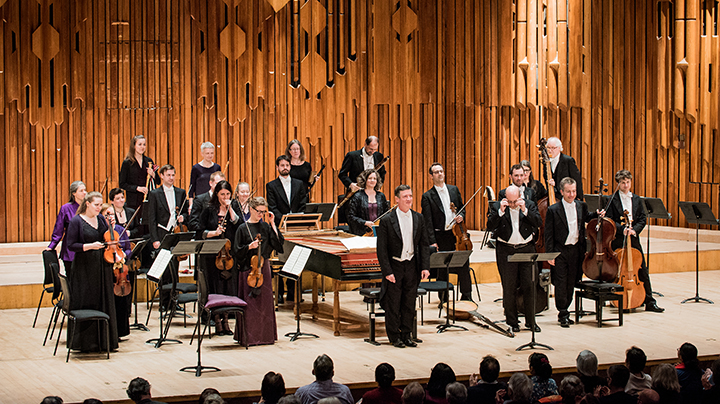
Let’s cast our minds back, beloveds, to Sunday, March 28th of 1982 when Leontyne Price and Marilyn Horne sang a joint recital from the stage of the Metropolitan Opera. It was televised live, broadcast over the radio (so you could enjoy it in stereo (remember that?), recorded by RCA and later released as a two album set (and in glaringly bright digital sound, no less!). The recording wasn’t released until just before Christmas of that year and it was waiting for me under the tree. I was allowed to open it on Christmas Eve and my mother even excused me from the family holiday party because I was so excited to relive the Teeny and Jackie magic again.
The third offering on the program was “Vivi tiranno!” from Handel’s Rodelinda and Marilyn Horne marched out onstage like the queen she is and destroyed everything in her path with her semi-automatic coloratura and Marianas trench chest-voice. I was stunned and although my appreciation of Mr. Handel’s operas was yet a very long way off, it did plant the seed.
Meanwhile I’ve spent nearly my entire life searching in vain for another performance of that aria that’s anywhere near as exciting. That is until last Tuesday night at the Music Center when Harry Bicket and The English Concert paid us a visit to perform what many consider Handel’s masterpiece for a one-night only event on their Rodelinda World Tour. Los Angeles was second on the itinerary after Berkeley, CA with imminent stops in Shanghai, Incheon, Saffron Walden (outside of Cambridge), and finally Carnegie Hall.
The real opera fans descended on the Dorothy Chandler Pavilion in force. Not those La bohème tourists who show up because they saw Cher in Moonstruck and thought it might be fun watching some poor soprano cough up a lung; I’m talking about an entire sea of people whose eyes have been ruined from too much reading. These are the folks who not only know what a cadenza is but are ready to judge you on yours by the standard set by a long dead singer for whom they still light candles on her heavenly birthday. These are the sistren and brethren who can actually spell “appoggiatura” without the help of spellcheck (which I just used).
Rodelinda, regina de’ Longobardi, as she’s known by her full name, has mayhap one of the most complicated plots of any baroque opera and glancing at the program synopsis in advance is gently advised. Before the stage action even starts Bertarido (countertenor), the King of Lombardy, has been defeated by Duke Grimaoldo (tenor) who now sits on the throne in Milan and lives in the palace with Bertarido’s wife Rodelinda (soprano in excelsis) and her son Flavio (mute). There’s Eduige (contralto) her sister-in-law to deal with who also had designs on Grimaoldo and by extension the throne. Plus scheming courtiers and counselors Garibaldo (bass) and Unulfo (another countertenor) do their best to stir the pot. Oaths are sworn, knives are drawn in the dark, and people are imprisoned. So goes three acts, six scenes, and three and a half hours until all ends well for everyone (except the bass).
Mr. Bicket took his place at the front of his ensemble dominated by dueling harpsichords, the other played by Tom Foster, and gave a sprightly account of the (blessedly short) overture. I’m not generally a fan of baroque opera, which in the wrong hands can sound very monochromatic. Plus, I think I have a mild allergy to straight-tone. Yet when confronted with playing this exquisitely vital and nuanced as this group is capable of it’s a near impossibility not to be won over. The twenty-five musicians played, to a person, as such a tight ensemble throughout that their mastery was easily evident. The cast, almost without exception, were at this same level of accomplishment and the singing was filled with purpose and great artistry.
I’ll dispatch with Brandon Cedel, the bass-baritone playing the scheming Garibaldo, first. On stage he’s tall and wildly handsome, but perhaps not to the manner born when it comes to the baroque. Although his legato singing improved over the course of the evening, and he only had two arias, his fioritura passagework didn’t come easily and his, “Tirannia gli diede il regno”, tended to the explosive.
I recently had to backpedal my stance on the countertenor voice and I now realize that it may be a combination of not having heard the voice type itself live very often (recordings just don’t do some voices justice) and not hearing singers of the highest distinction. That said, the Unulfo, sung by countertenor Aryeh Nussbaum Cohen, had a stunningly beautiful instrument. At the broader ends of his range it takes on very unique coloration and resonance. His Act 3, “Un zeffiro spirò’ was sumptuously performed across a very wide vocal spectrum to the audience’s delight.
Mezzo-Soprano Christine Rice sang Eduige, the King’s sister and she who was formerly betrothed to the usurper Grimoaldo. Although singing above her weight-class, and not the contralto called for in Handel’s score, she dispatched all the technical challenges put before her with relative ease. She also made an excellent foil for whomever she had to interact with and got off some marvelously cheeky line readings throughout the evening, which made her an audience favorite.
The character of Grimoaldo is surprisingly complex and in spite of having defeated the king and stolen his throne (and now attempting to do the same with the King’s wife) he refuses to stoop to the very lowest levels of depravity to achieve his goals. How refreshing. Tenor Eric Ferring brought a dulcet tone and ever increasingly graceful phrasing to Handel’s vocal writing. His Act 2 aria, “Prigioniera ho l’alma in pena”, was expertly sung and then crowned with some deftly rendered, very challenging ascending phrases.
Much anticipation was created by the Handel hardcores for the appearance of Iestyn Davies and it was apparent why from the first. He crept onstage purposefully during the musical introduction to his opening air in Act 1, “Dove sei, amato bene?”, and then proceeded to give a veritable master-class in proper baroque technique. At its conclusion he was rewarded with a rock-star ovation from the L.A. crowd. A role written for the legendary castrato Senesino, Bertarido’s music may be among some of the most exposed and difficult written for the voice. Mr. Davies was in complete control from his first utterance. He made his longing for his wife palpable not only with his voice but also with his intense concentration on the words. The tone was much bigger than I anticipated and he had no trouble being heard in the famously dry acoustic of the Dorothy Chandler. His subtlety and range of inflection was so exquisite as to be breathtaking at times. He spit fire during, “Vivi tiranno!”, in the last scene disappointing no one.
After Bertarido’s entrance in Act 1 it’s interesting to hear Handel answer himself back just a few pages later with Rodelinda’s, “Ombre, piante, urne funeste”. as both pieces express almost the same loss and longing from husband to wife. The brilliant Lucy Crowe, who made such a glittering impression in last season’s Alcina, really came into her own with the Queen’s heartrending expressions of grief and loss here. Beautifully echoing the tone of the flute and dispatching all manner of vocal graces with ease. I especially loved how she would soar to the top of her range with a pinpoint of sound and expand it out fully (yet never too fully, keeping within the style). The messa di voce is strong with this one. Her prowess and ease of expression only grew throughout the evening and by time she reached her final, “Mio caro bene”, she was literally sailing through her music like a firework.
The absolute highlight of the performance was their duet, “Io t’abbraccio” that concludes Act II. Bertarido, having been discovered by his enemies, is about to be imprisoned and he and Rodelinda bid each other farewell after having only been recently reunited. Ms. Crowe and Mr. Davies’ voices entwined and broke from each other in such delicious concert it seemed as though time was standing still. At the concluding cadenza there was a tandem trill from both, perfectly mirrored, that was so unlike anything I’ve heard in the theater before that it was almost indecent.
Mr. Bicket remained an absolute master of tempo and an accompanist of the highest level throughout the long evening. To hear this group making music so assured and lovingly rendered was an honor that I hope keeps repeating itself.
My assumption is that Mr. Bicket is also responsible for the staging itself, and although there wasn’t much in the way of blocking, someone did make the decision that the singers should exit the stage during their postludes rather than stay to soak up their applause. Although it seemed churlish at first, in retrospect, it did keep a long evening from ballooning out even longer.
For those who are interested in reliving the experience high you hence to your favorite music purveyor for The English Concert’s recording on the Linn label with an almost identical cast, for its pleasures are many.
The other thrill of the evening was espying operatic royalty in the audience in the personage of mezzo soprano Susan Graham, the Artistic Advisor for our Young Artists Program. She was shockingly dressed like a normal person, no tiara or nothin’. I was so desperate to fanboy all over her but decided to spare her my indignities. Maybe next time.
Photo: Robert Workman



























Comments